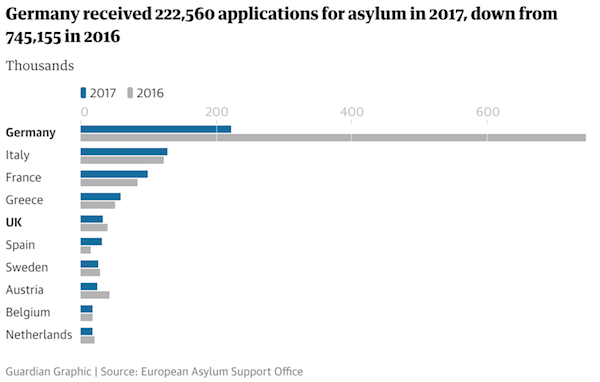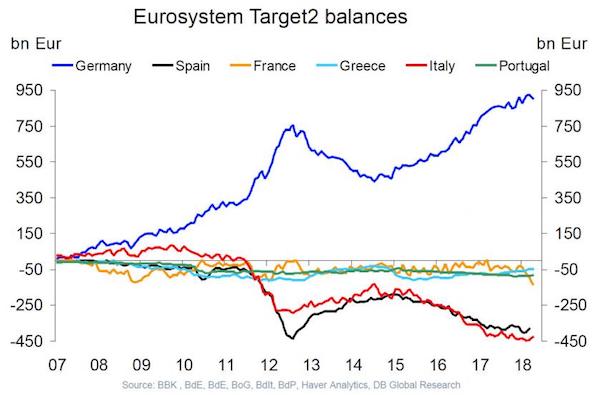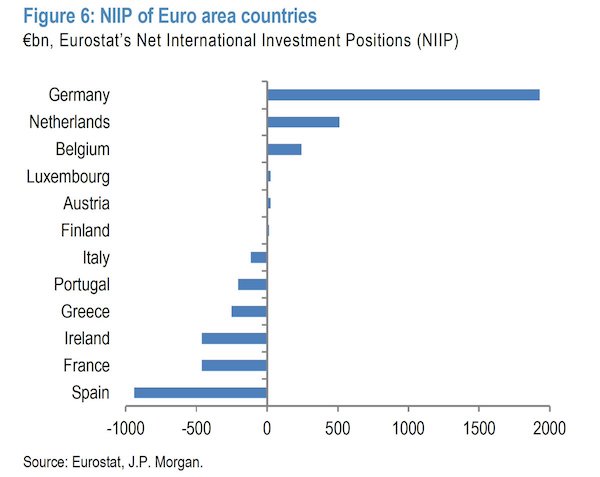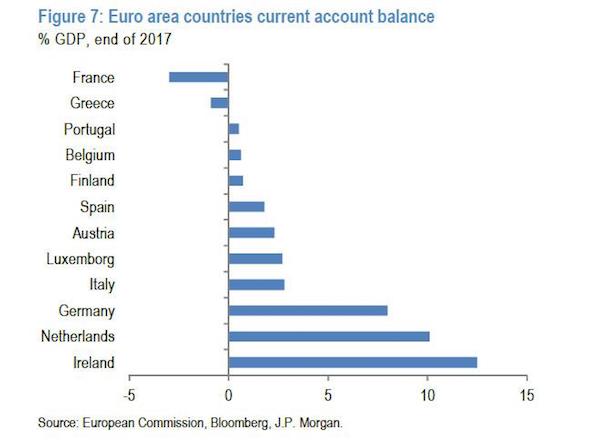
Vittorio Matteo Corcos Sogni 1896

If you’re not outraged by Assange’s situation, you have no right to be outraged by anything else.
• Threatened By The Truth – Julian Assange Anniversary (IE)
Today marks the sixth anniversary of Wikileaks founder Julian Assange’s effective house arrest in London. He cannot move around in public, because he fears he will be arrested and extradited to America — a daunting prospect, since a UN special rapporteur described Chelsea Manning’s treatment by that country’s justice system as torture. Assange is divisive. Hawks wish him nothing but misfortune and a stretch in jail. According to journalist John Pilger, a leaked official memo says: “Assange is going to make a nice bride in prison. Screw the terrorist. He’ll be eating cat food forever.” If you stand at the other end of the spectrum, Assange is a hero who revealed how our world really works.
Consequently, he has been relentlessly targeted. Hilary Clinton has contributed to this process, as Assange highlighted the Clintons’ links with Saudi Arabia and the multimillion donations that kingdom made to their foundation, after she, as secretary of state, sanctioned an $80bn Saudi arms deal. Assange remains, despite illegal efforts to revoke it, an Australian citizen, but he has not enjoyed the support a person who has not been charged with anything, much less convicted of anything, might expect from a democracy. These are indeed murky waters, but Assange’s ordeal reconfirms a truth: News is something someone, somewhere, does not want published. That’s why he is such a threat.

Yes, the treatment of children on America’s borders is a disgrace. But don’t make it an echo chamber issue. Kids in Hodeida are much worse off. Where is the outrage?
• 25,000 Flee As Fighting In Yemen Port City Hodeida Escalates (AP)
The UN spokesman said on Monday that tens of thousands of residents have fled the fighting along Yemen’s western coastline, where Yemeni fighters backed by a Saudi-led coalition are engaged in fierce battles with Iranian-backed Houthi rebels. Stephane Dujarric, the spokesman for the UN secretary-general, told reporters on Monday that about 5,200 families, or around 26,000 people, have fled the fighting and sought safety within their own districts or in other areas in Hodeida governorate. ‘‘The number is expected to increase as hostilities continue,’’ he said. Emirati troops, along with irregular and loyalist forces in Yemen, have been fighting against Houthis for Hodeida since Wednesday.
Coalition warplanes rained missiles and bombs on Houthi positions near Hodeida airport, in the city’s south. The offensive for Hodeida has faced criticism from international aid groups, who fear a protracted fight could force a shutdown of the city’s port and potentially tip millions into starvation. About 70 percent of Yemen’s food enters via the port, as well as the bulk of humanitarian aid and fuel supplies. Around two-thirds of the country’s population of 27 million relies on aid, and 8.4 million are already at risk of starving.

And there are more things you should be outraged by.
• It’s Time To Get Enraged At What Western Imperialists Have Done To Syria (CJ)
Rumors are again swirling of an impending false flag chemical weapons attack in Syria, just as they did shortly before the highly suspicious Douma case in April. Warnings from Syrian and Russian intelligence, as well as US war ship movements and an uptick in US funding for the Al Qaeda propaganda firm known as the White Helmets, give these warnings a fair bit of weight. Since the US war machine has both a known regime change agenda in Syria and an extensive history of using lies, propaganda and false flags to justify military interventionism, there’s no legitimate reason to give it the benefit of the doubt on this one. These warnings are worth taking seriously.
So some people are understandably nervous. The way things are set up now, it is technically possible for the jihadist factions inside Syria and their allied imperialist intelligence and defense agencies to keep targeting civilians with chemical weapons and blaming the Assad government for them until they pull one off that is so outrageous that it enables the mass media to manufacture public support for a full-scale assault on Damascus. This would benefit both the US-centralized empire which has been plotting regime change in Syria for decades and the violent Islamist extremists who seek control of the region. It also creates the very real probability of a direct military confrontation with Syria’s allies, including Russia.
But the appropriate response to the threat of a world war erupting in Syria is not really fear, if you think about it. The most appropriate response to this would be unmitigated, howling rage at the western sociopaths who created this situation in the first place.

No stabilizers.
• Paul Tudor Jones Warns The Next Recession Will Be ‘Really Frightening’ (Y.)
Legendary global macro trader Paul Tudor Jones is warning that asset prices are too high. And furthermore, he’s concerned about what the next recession might look like. He shared his thoughts on Monday during a conversation with Goldman Sachs CEO Lloyd Blankfein as part of the firm’s “Talks at GS” series. The hedge fund billionaire, who rarely gives interviews or makes public comments on the markets, cautioned that across asset classes “you have to be thinking this is a highly dubious sustainable price.” Jones doesn’t think the low interest rates we have now due to easy monetary policy are sustainable over time. He said that interest rate policy is “crazy.” He further argued that the Trump administration’s stimulative fiscal policy isn’t sustainable either.
“You look at prices of stocks, real estate, anything,” he said. “We’re going to have to mean revert to a normal real rate of interest with a normal term premium that’s existed for 250 years. We’re going to have to get back to that. We’re going to have to get back to a sustainable fiscal policy and that probably means the price of assets goes down in the very long run.” In the short run, the market is “jacked up and ready to go,” he said. Blankfein added that it’s like “pouring lighter fluid on an already lit fire.” During the financial crisis, central banks had a lot of room to ease monetary policy and governments had more flexibility to push stimulative fiscal policy. Today, there’s less room and flexibility.
“The next recession is really frightening because we don’t have any stabilizers,” Jones said. “We’ll have monetary policy, which will exhaust really quickly, but we don’t have any fiscal stabilizers.”

“Trump is going to have to find some way to back down and let China save face..”
• Trump Threatens New Tariffs On $200 Billion In Chinese Goods (CNBC)
President Donald Trump has requested the United States Trade Representative to identify $200 billion worth of Chinese goods for additional tariffs at a rate of 10 percent. The new duties will go into effect “if China refuses to change its practices, and also if it insists on going forward with the new tariffs that it has recently announced,” the president said in a statement provided by the White House late on Monday. Beijing has pledged to fight back if Trump goes ahead with the new tariffs. U.S. stock index futures fell following the news, while Asian equity markets were mixed. It’s the latest development in escalating trade tensions between the world’s two largest economies.
On Friday, the U.S. announced a 25 percent tariff on up to $50 billion of Chinese products, prompting Chinese President Xi Jinping’s administration to respond witha 25 percent tariff on $34 billion of U.S. goods. “It’s one thing to retaliate with $50 billion here and $50 billion there but when the [U.S.] president trots out another $200 billion, that’s quite concerning,” Max Baucus, former U.S. ambassador to China under President Barack Obama, told CNBC. “This reminds me little bit of an old western … If there’s a gunfight trade war, somebody’s going to get hurt,” he continued: “Trump is going to have to find some way to back down and let China save face so that both sides can back down gradually and respectfully.”

Democracy?
• China Enters the Trade Trap (IICS)
Perhaps nobody knows what President Trump will do next, including President Trump, but right now it looks like he has successfully maneuvered China into a trade trap. The goal is to slow China’s economy such that military modernization slows and its economy cannot catch up with the United States. Meanwhile, implementation of this strategy is called “Beijing’s playbook” and the whole time President Trump speaks positively about Xi Jinping and China’s help in other areas. Bloomberg: Xi to Counter Trump Blow for Blow in Unwanted Trade War “The Chinese view this as an exercise in self-flagellation, meaning that the country that wins a trade war is the country that can endure most pain,” said Andrew Polk, co-founder of research firm Trivium China in Beijing. China “thinks it can outlast the U.S. They don’t have to worry about an election in November, let alone two years from now.”
This is the mistake autocrats always make about Western governments and the United States. They view the messy and inefficient political system (intentionally designed that way to protect liberty) as a weakness. They think politicians care more about elections than anything else. They see the difficulty in reaching consensus as a weakness. However, they miss the fact that democratic governments enjoy greater legitimacy. If the U.S. reaches a majority in favor of confronting China on trade, then President Trump has the far stronger political hand. Confronting China on trade raises President Trump’s popularity. His base and independent voters favor this policy. Democrats oppose him because he is Trump, but they would lose votes if the only issue in November was “Confront China on trade, yes or no?”

“..new issuance of Treasuries “will absorb such a large share of dollar liquidity that a crisis in the rest of the dollar bond markets is inevitable.”
• Chasing Yield during ZIRP & NIRP Evidently Starved Human Brains of Oxygen (WS)
Let’s be clear: It’s not just Argentina. But Argentina is the most elegant example. The exodus of the hot money from emerging markets where cheap dollar-debts were used to fund pet projects and jack up leverage is – once again – in full swing. Cheap dollar-debt in emerging markets is an old sin that, like all old sins, is repeated endlessly. The outcome is always trouble. But during the act, it sure is a lot of fun for everyone. The exodus of the hot money is even gripping the non-basket-case emerging economies of Asia where it’s causing the worst indigestion since 2008.
Bloomberg: “Overseas funds are pulling out of six major Asian emerging equity markets at a pace unseen since the global financial crisis of 2008 – withdrawing $19 billion from India, Indonesia, the Philippines, South Korea, Taiwan, and Thailand so far this year.” While emerging markets shone in the first quarter, suggesting resilience to Federal Reserve tightening, that image has shattered over the past two months. With American money market funds now offering yields around 2% – where 10-year Treasuries were just last September – and prospects for more Fed hikes, the bar for heading into riskier assets has been raised.”
“It’s not a great set-up for emerging markets,” James Sullivan, head of Asia ex-Japan equities research at JPMorgan Chase, told Bloomberg. “We’ve still only priced in about two thirds of the US rate increases we expect to see over the next 12 months. So the Fed is continuing to get more hawkish, but the market still hasn’t caught up.” [..] “Dollar funding of emerging market economies has been in turmoil for months now,” Patel wrote – because yeah, the era of the cheap dollar is over, and investors should have figured that out two-and-a-half years ago when the Fed started hiking rates. But the market didn’t want to believe that the Fed would actually do it. And suddenly over the past two months, it downs on these geniuses that the Fed has actually been hiking rates and will continue to do so for some time.
Patel not only blamed the QE unwind but also the simultaneous and massive issuance of new Treasury debt by the US government to fund its ballooning deficits. This new issuance of Treasuries “will absorb such a large share of dollar liquidity that a crisis in the rest of the dollar bond markets is inevitable.”

Excellent speech by Yanis. Read and learn. He may be the only one around with a real way to save the EU.
• Why Germany Neither Can Nor Should Pay More To Save The Eurozone (Varoufakis)
[..] I wanted a Germany that was hegemonic and efficient, not authoritarian and caught up in a European Ponzi scheme. That was in 2013. Two years later, in March 2015, I wrote an article, while Greece’s finance minister, referring to the first and second bailout loans, of 2010 and 2012. Allow me to quote from it: “The fact is that Greece had no right to borrow from German – or any other European – taxpayers at a time when its public debt was unsustainable. Before Greece took on any loans, it should have initiated debt restructuring and undergone a partial default on debt owed to its private-sector creditors. But this “radical” argument was largely ignored at the time.
Similarly, European citizens should have demanded that their governments refuse even to consider transferring private losses to them. But they failed to do so, and the transfer was effected soon after. The result was the largest taxpayer-backed loan in history, provided on the condition that Greece pursue such strict austerity that its citizens have lost one-quarter of their incomes, making it impossible to repay private or public debts. The ensueing – and ongoing – humanitarian crisis has been tragic… Animosity among Europeans is at an all-time high, with Greeks and Germans, in particular, having descended to the point of moral grandstanding, mutual finger-pointing, and open antagonism. This toxic blame game benefits only Europe’s enemies.”

More Europe at this point in time will only lead to more tension.
• Macron’s Euro Zone Reforms: Grand Vision Reduced To Pale Imitation (R.)
When French President Emmanuel Macron laid out a sweeping vision for eurozone reform last September, he spoke of “rebuilding Europe”, with a common budget for the euro nations and a single minister to oversee it all. The proposals he will discuss when he sits down with German Chancellor Angela Merkel outside Berlin on Tuesday will be far less ambitious, with deep differences between the two European powerhouses. Many economists agree with Macron that fundamental reforms are needed to strengthen the eurozone and insulate the single currency — the most potent symbol of Europe’s integration — from future crises, like the 2010-13 sovereign debt contagion that nearly tore the euro apart.
But Merkel has limited room to act due to political pressure at home, and is always at pains to ensure France and Germany aren’t pushing ahead with plans that have no deep backing from the rest of the European Union. Macron and Merkel will discuss a separate budget for the 19 countries that share the single currency but much smaller than he wanted. Then there are gaps in opinion over a fund to calm bond markets in a crisis and a backstop for the banking system. “Things are going in the right direction, but the proposals we’re getting from the Germans aren’t sufficient,” said a French official who acknowledged there were deep differences between the two sides.
A German official said there were still big questions about what sort of agreement Tuesday’s meeting would produce on the budget for the euro zone. The official said Merkel’s recent political troubles over migration policy could mean she is less inclined to make concessions to the French leader. Besides the disagreement between France and Germany, it is also the nature of negotiations between the eurozone countries that grand ideas get chipped away at until a compromise is reached that satisfies all parties.

“Where Germany has trading partners willing to borrow big to buy Mercedes and Beemers, the US has the world’s reserve currency, which acts as an unlimited credit card for our entitlement state and military/industrial empire.”
• Hopeless European Millennials And The Populist Takeover (John Rubino)
Europe is frequently held up as an example of how the rest of the world should behave on a variety of issues. But this comparison misses at least two things: First, “Europe” is actually a lot of different countries in a lot of different situations. Second, much of what seems to work over there only does so because it’s being financed with ever-increasing amounts of debt. For countries, as for individuals, borrowing money is fun at first but beyond a certain point becomes debilitating, as interest payments begin to crowd out everything else. That’s where a growing number of Europe’s failed states now find themselves, with overly-generous pensions and overly-restrictive labor laws making it virtually impossible to run a functioning market-based economy.
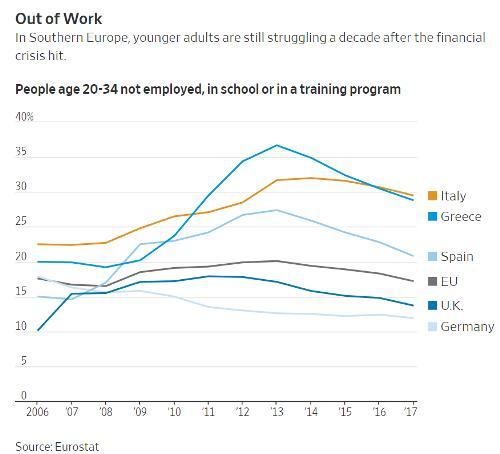
The result: Fewer good jobs and more frustrated voters – especially young ones who have seen only the downside of the current system – and the resulting rise of populist political parties that recognize the problems without offering coherent solutions, thus guaranteeing even more chaos in the future. As Today’s Wall Street Journal notes, in Italy and Greece, nearly a third of young adults not only aren’t working but aren’t enrolled in school or training. What are they doing? Apparently just sitting around and stewing about life’s injustice. As for where they’re sitting and stewing, in Greece, Italy and Spain it’s now normal for adults all the way into their 30s to live with their parents, largely because they can’t find work that pays enough to afford a house, car and other requirements of independent life.
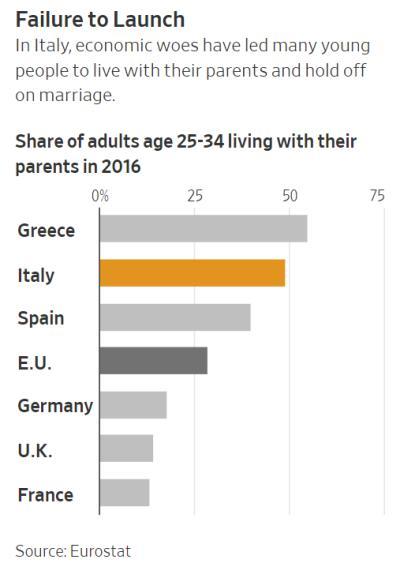
As for Germany, which looks great by comparison, keep in mind that a big part of its economic outperformance is due to other EU countries borrowing huge amounts of money to buy German exports. When the latter run out of money – a point which is clearly coming – Germany suffers twice, once when it loses important customers and again when its banks, having lent trillions of euros to Italy, Spain, et al, have to eat those losses. But bad-mouthing Europe should not be seen as implicit praise of the US. We, like Germany, have an advantage that’s both unfair and temporary. Where Germany has trading partners willing to borrow big to buy Mercedes and Beemers, the US has the world’s reserve currency, which acts as an unlimited credit card for our entitlement state and military/industrial empire.

Starting to like Sanchez.
• Spain’s New Government To Remove Franco’s Remains From Mausoleum (AFP)
Spain’s new Socialist government is determined to remove the remains of Francisco Franco from a vast mausoleum near Madrid and turn it into a place of “reconciliation” for a country still coming to terms with the dictator’s legacy. “We don’t have a date yet, but the government will do it,” Prime Minister Pedro Sanchez said late Monday during his first television interview since being sworn in on June 2 after toppling his conservative predecessor Mariano Rajoy in a confidence vote. He recalled that a non-binding motion approved last year in parliament called for Franco’s remains to be exhumed from the massive Valley of the Fallen mausoleum some 50 kilometres (30 miles) northwest of Madrid and the site turned into a “memorial of the victims of fascism”.
“Spain can’t allow symbols that divide Spaniards. Something that is unimaginable in Germany or Italy, countries that also suffered fascist dictatorships, should also not be imaginable in our country,” Sanchez added. Earlier on Monday Socialist party spokesman Oscar Puente said the mausoleum should be transformed into a “place of reconciliation, of memory, for all Spaniards, and not of apology for the dictatorship.” Franco ruled Spain with an iron fist from the end of the country’s 1936-39 civil war until his death in 1975, when he was buried inside a basilica drilled into the side of a mountain at the Valley of the Fallen, one of Europe’s largest mass graves.

A history. “Simply provide everyone with a basic income so that they can afford to live, then let them get on with whatever they want to do.”
• A Very British Disease (Coppola)
The desire to judge people’s motives rather than addressing their needs is a “British disease”. We have been suffering from it for hundreds of years, cycling endlessly through repeated cycles of generosity and harshness. Each cycle ends in public outrage and an abrupt reversal: but the memory eventually fades, and the disease reappears in a new form. In this post, I outline the tragic history of Britain’s repeated attempts to “categorise the poor”.
[..] worst of all, using rules and sanctions to compel the genuinely work-shy to work diverts attention and resources away from those who really need help. And it unfairly stigmatises the vast majority of those who are not working, or who are not working as many hours as we think they should, whether through unemployment, sickness or disability. Study after study has shown that in general, people want to work. The problem is that suitable jobs aren’t always available. And yet there remains a prevalent view, even among people who should know better, that people must be compelled to work, or to work harder, with harsh treatment. But today’s sanctions for those who won’t or can’t work are mild compared to the punishments of old: why should they be any more successful?
We would do better to concentrate our attention on helping those who genuinely want to work to find fulfilling, productive and well-paid jobs. And we should also stop trying to decide whether someone “deserves” social support. We have been trying to distinguish between the “deserving” and “undeserving” poor for eight hundred years, and we are no better able to make that judgement now than we were in the fourteenth century, or the sixteenth, or the nineteenth. It is time to give up this fruitless attempt to judge people’s motives. Simply provide everyone with a basic income so that they can afford to live, then let them get on with whatever they want to do.

Next up: sell Parliament.
• Thousands Of Public Buildings And Spaces In England Sold Off A Year (G.)
More than 4,000 public buildings and spaces in England are being sold off every year, with more than 7,000 others at risk over the next five years, a charity has said. Locality says the majority of the sites being offloaded by local authorities are sold to private developers for the highest price, forever lost to communities around them. The charity wants the government to create a £200m-a-year community ownership fund for the next five years to help preserve the buildings and spaces for the use of local people. Tony Armstrong, its chief executive, said: “This is a sell-off on a massive scale. We know that many of the buildings being lost have valuable community uses.
“Everyone of us can think of a local public building or outside space we love and use, from libraries to lidos and town halls to youth centres. They are owned by the public and they’re being sold off for short-term gain to fill holes in council budgets. “Many hundreds of local community groups are stepping up and fighting for community ownership. But they urgently need support and help with startup costs if they are to compete with the commercial developers.” The Great British Sell Off report is published on Tuesday and is based on freedom of information requests sent to all 353 local authorities in England. Locality received 55 responses on the number of buildings and spaces sold between the financial years 2012-13 and 2016-17, as well as 127 replies about sites identified as surplus over the next five years, extrapolating the results to obtain national totals.

“..if human relations are solely about power, than exercising power over others is all that matters..”
Mr. Peterson laid it out nicely: identity politics assigns everyone to ethnic, racial, and sexual groups, and all the human relations among them amount to never-ending battles for political power. Nothing else matters. Individuals especially don’t matter, only the group. And no group has abused its power more than European white men. This animating idea comes out of the mid-20th century “post-structural critical theorists” Jacques Derrida and Michel Foucault, whose Marxian views emerged conveniently at a time when women and non-white people were vying for departmental chairs in the college humanities and social science programs, and thus have two generations been indoctrinated.
Well, if human relations are solely about power, than exercising power over others is all that matters. Hence, the key to identity politics: it’s all about coercion, making others do your will by threat of force and force itself. These days, the main threat is depriving heretics and apostates of their livelihood. That’s what happened to Brett Weinstein at Evergreen U in Washington State last year, and to Jordan Peterson himself at the U of Toronto, when he objected loudly and publicly to a new Canadian federal law that sought to punish citizens who refused to use the new menu of personal pronouns for the rapidly multiplying new gender categories (e.g. ze, zir, they, xem, nem, hir, nir….)
Both Weinstein and Peterson refused to be coerced and found themselves inadvertently leading a movement against the pervasive, creeping coercion of our time — which has now spread from the campuses into corporate life, with the HR departments working overtime to enforce thought among employees, because company profits are at stake (e.g. Starbucks day-off for “diversity and inclusion training”).

Somewhat curious that the big political problems start just as the numbers fall.
• Sharp Fall In Number Of People Seeking Asylum In EU (G.)
Fewer people sought asylum in the European Union last year, although numbers remain higher than before the arrival of 1 million people in 2015 triggered a political crisis that continues to divide Europe. Showing a sharp drop in asylum claims, the latest report from the EU’s asylum office was published on Monday after emergency talks in the German government over asylum policy and a bitter standoff between EU nations over a migrant rescue ship that eventually docked in Spain after being banned from Italy and Malta. The EU’s asylum office counted 728,470 applications for international protection in 2017, a 44% reduction on the 1.3m applications the previous year.
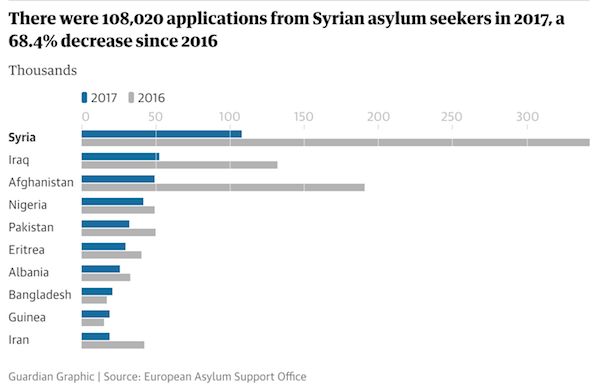
More than 1 million people entered the EU in 2015, many fleeing the war in Syria. Syria, Iraq and Afghanistan remain the most frequent countries of origin for asylum seekers, accounting for 29% of all claims. The downward trend of asylum claims continued in the first four months of 2018, the EU asylum office said, although numbers have still not returned to pre-crisis levels. About 460,000 people applied for asylum in EU countries in 2013. The fall in asylum applications reflects a sharp drop in people making the hazardous journey over the eastern Mediterranean to Greece and the central Mediterranean to Italy, although there has been an increase in people travelling from west Africa to Spain, albeit from a lower base.
Germany continues to receive more applications for asylum than any other country in Europe, with 222,560 claims in 2017, folowed by Italy, France and Greece. The UK was in fifth place, with 33,780 applications, accounting for 4.6% of all EU asylum claims. But the backlog remains high: 954,100 claims are awaiting a decision, including 443,640 in Germany, according to the EU asylum office.
